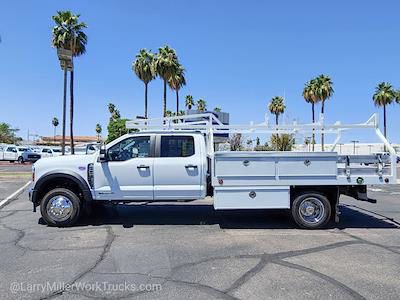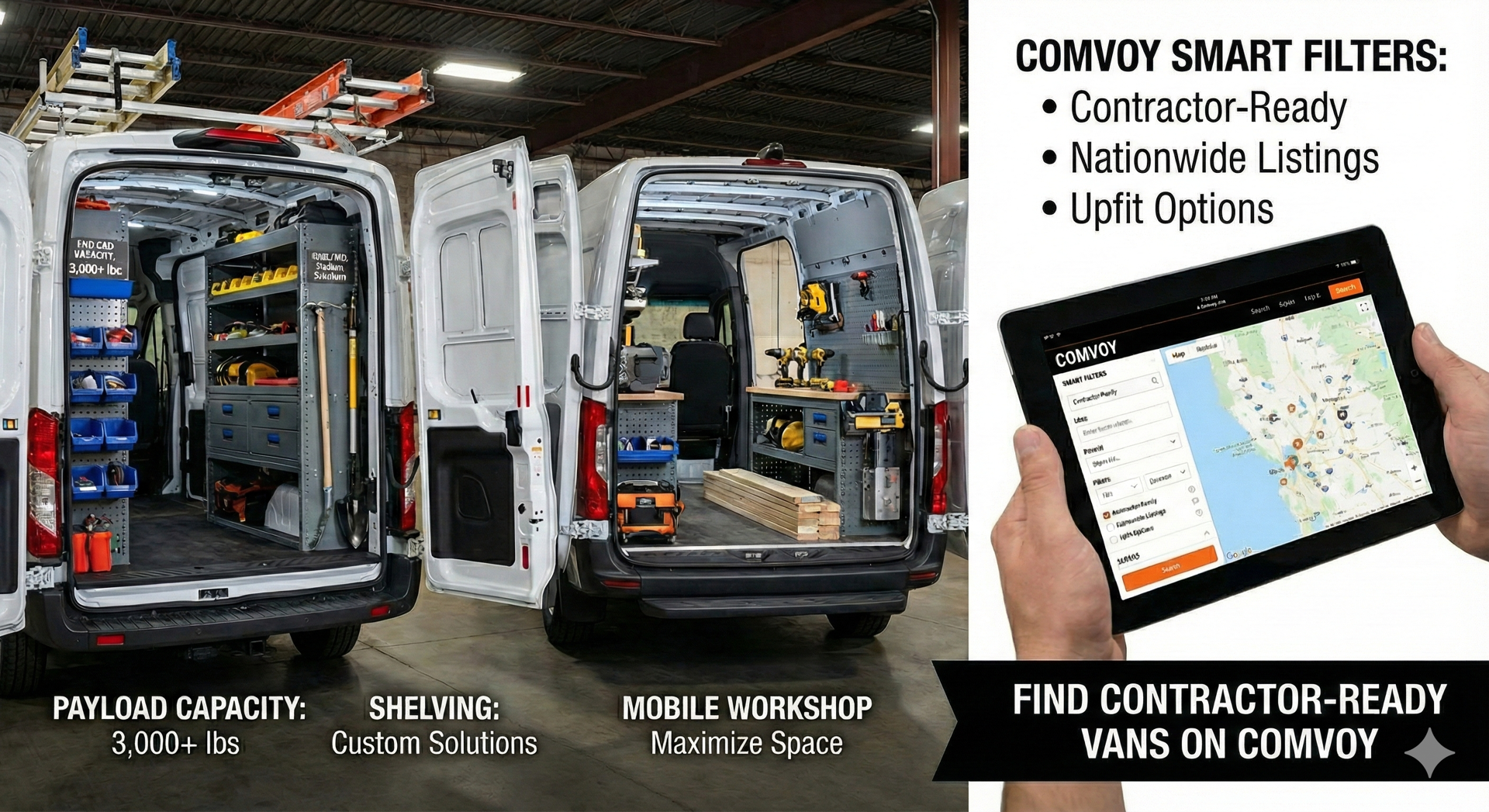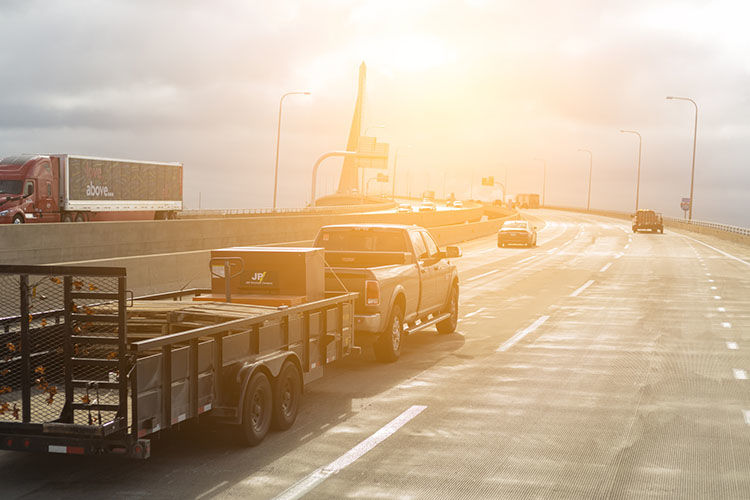General Contractors: 5 Considerations When Buying a Work Truck


General Contractors: 5 Considerations When Buying a Work Truck
For general contractors, a work truck isn’t just a vehicle—it’s a critical tool that impacts efficiency, security, and mobility. Whether you're hauling materials to a job site, storing valuable tools, or managing crew transportation, the right truck can streamline operations and enhance productivity. But choosing the best fit requires more than picking the latest model; it’s about understanding how your daily work demands shape the decision. Here are five key factors to consider before making your next purchase.
1. The Types of Construction Jobs

The nature of your work directly influences the truck that best serves your needs. If you frequently transport heavy equipment or materials, a truck with high towing capacity and reinforced suspension is essential. For contractors managing multiple small projects within a city, maneuverability and fuel efficiency take precedence. Those working in remote locations may need a four-wheel-drive truck with enhanced durability and off-road capability, while contractors focusing on security-sensitive jobs, such as electrical or plumbing work, might prioritize enclosed tool storage and reinforced locking systems. By considering how your daily tasks shape vehicle demands, you ensure your truck is an asset rather than a limitation.
Are you towing trailers? Are you hauling your crew as well as every last tool they can fit in the bed? Overlooking your material weight, vehicle towing, and hauling capacity can cost you money in repairs, fuel, and above all, time.
A critical step in determining what your next work truck needs to handle is thinking about whether or not this vehicle will be delivering heavy, bulky materials to the job site. If most of your supplies are delivered and stored onsite, light-duty pickups such as the Sierra/Silverado, Ram, or Ford F-Series will likely meet your needs.
For contractors requiring maximum hauling and towing power, medium-duty work trucks such as the F-450, Silverado 4500, and Ram 4500 are compelling, with exceptional capacity for handling heavy loads and demanding worksite conditions.
2. Matching Interior Space With Crew Size

The size of your crew plays a significant role in determining the ideal truck body style. If your work requires transporting multiple team members to job sites, a crew cab with four full-size doors and ample seating ensures comfort and efficiency. For smaller teams or solo contractors, a standard cab may be more practical, prioritizing cargo space and cost over passenger capacity. Extended cab options offer a balance, providing extra seating while maintaining valuable storage room for tools and materials. When selecting a truck, consider not only the number of passengers but also how frequently your crew travels together, ensuring your vehicle supports both productivity and convenience.
3. Fuel Type - Gas Vs. Diesel
The debate between diesel and gas is coupled with specifications like fuel economy, towing capacity, and horsepower. When we discussed this topic with Peter Bates at Weaver Bros, he offered some great points about the benefits of both.
"Stopping and starting time, and idle time is the cost of doing business. In the case of our light-duty trucks and some of our half tons, we run gasoline almost exclusively. For our heavier trucks, we use diesel engines due to the fuel economy and towing capacity advantages. Overall, fuel economy is not a main focal point in our smaller, light-duty trucks as they travel. Stopping and starting time, and idle time is the cost of doing business. That said, horsepower is an area of focus in our heavier vehicles. A cheaper engine with less power may cost more down the line in repairs and fuel costs due to the strain on the vehicle from towing or hauling."
The choice between gasoline or diesel-powered engines comes down to what you need this truck to do. If you need a truck that can tow equipment uphill without hesitation, a more powerful diesel engine would be the route to take as they generally produce more torque than gas engines. However, if you are adding a vehicle to your fleet that will mainly be used for transporting crew and tools, a light-duty gas pickup may be the best option.
4. Tool Storage In Your Work Truck

Choosing the right tool storage setup ensures efficiency and security on the job. Pickups can be upfitted with various toolbox options to match different work needs. Crossbed toolboxes sit behind the cab, providing a convenient and secure space for frequently used tools. Side-mount boxes allow easy access along the truck bed while keeping equipment protected. Wheel well boxes maximize storage without encroaching on bed space, ideal for contractors who need room for larger cargo. Pull-out chest boxes offer deep storage for bulkier tools while maintaining organization.
For those transporting large, unwieldy cargo alongside tools, a flatbed truck with under-body boxes or a contractor truck can be the best solutions, offering flexibility while ensuring essential equipment remains secure. Selecting a setup tailored to your workflow keeps tools accessible and protected, improving efficiency on every job.
5. Security Matters: Keeping Your Work Truck & Tools Safe & Secure
As general contractors, you know and feel the cost of purchasing new tools and equipment. Costs can stack up quickly. High-demand work and a constant race for time make work truck security an absolute necessity. Peter Bates of Weaver Bros Construction Co. suggests:
“We are always using our GPS tracking system to ensure our vehicles are safe and where they are supposed to be. The main security method we employ is one of common sense. We make it well known that our guys are to be locking their trucks at night and moving valuables out of plain sight. In addition, we also keep our larger trucks and equipment in a fenced-in area overnight or when they are not in use.”
Bates’s acknowledgment of the fundamentals of security are a great baseline to think about when considering a new work vehicle. On top of reasonable common sense, most modern trucks can be equipped with in-bed toolboxes, aftermarket upgraded security systems, and tracking systems. These can offer peace of mind and trust in your work truck. When you go to purchase your next work truck, it is important to ask the dealer about what it would take to make this truck as secure as you need it to be.
Conclusion
A work truck is more than just transportation—it’s a crucial tool that supports your efficiency, security, and productivity on the job. By carefully assessing factors like job demands, crew size, storage solutions, and travel needs, general contractors can make a well-informed decision that enhances daily operations. Whether it’s selecting the right body style, optimizing tool storage, or ensuring towing capacity aligns with workload requirements, the right truck investment pays dividends in reliability and performance.
 About the author: Ryan E. Day is a communications specialist at Work Truck Solutions, where he turns complex ideas into engaging content that drives business impact across industries and platforms. With 13 years of experience in B2B content marketing, Ryan specializes in storytelling, strategic messaging, and digital optimization.
About the author: Ryan E. Day is a communications specialist at Work Truck Solutions, where he turns complex ideas into engaging content that drives business impact across industries and platforms. With 13 years of experience in B2B content marketing, Ryan specializes in storytelling, strategic messaging, and digital optimization.
Ryan's work has been featured in Comvoy, Quality Digest, Youtube, and Amazon Kindle. Connect with Ryan on his Linkedin page.
UPDATED ON: AUGUST 13, 2025
Published on: September 03, 2019 Driving Business Growth Through Financial Flexibility: How You Buy Your Truck Matters
Driving Business Growth Through Financial Flexibility: How You Buy Your Truck Matters Best Work Vans for Contractors
Best Work Vans for Contractors 2026 Commercial Trucks and Vans: What’s New from Ford, GM, and Ram
2026 Commercial Trucks and Vans: What’s New from Ford, GM, and Ram The Value of Work Ethic: Comvoy.com Promotes Mike Rowe's Work Ethic Scholarship Program
The Value of Work Ethic: Comvoy.com Promotes Mike Rowe's Work Ethic Scholarship Program Summer Fleet Maintenance: How to Protect Commercial Vehicles from Extreme Heat
Summer Fleet Maintenance: How to Protect Commercial Vehicles from Extreme Heat







